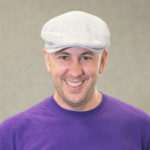4 Ways to Supercharge Your Social Impact

Alvar Aalto, a Finnish Architect and Designer who was designing in the mid-1900’s, spoke of the journey of the seed of an idea to its execution. He once said, “Architecture in its details are in some way all part of biology. Perhaps they are like a salmon or trout – they’re not born fully grown, they’re not even born in the sea or the water where they normally live. They’re born hundreds of kilometres away from their home grounds, where the rivers narrow to tiny streams. Just as it takes time for a speck of fish spawn to mature into a fully-grown fish, so we need time for everything that develops and crystallises in our world of ideas”.
I love the thought of an idea developing from something somewhat small and insignificant, but to eventually reach maturity and really change the things we see that are broken in our world. I’ve heard others describe the path of an idea from the fringes and margins of a society, until it eventually becomes part of the centre – our mainstream, common thought, part of the public agenda. It’s one of the reasons I love visiting art galleries and working with creatives. They draw our attention to issues using the medium of art. They give voice to areas of our society that needs to change.
Remarkable is a division of Cerebral Palsy Alliance and we believe that technology has a part to play in promoting an understanding of disability issues and mobilising support for the dignity, rights and well-being of persons with disabilities. If you think about the way that powered wheelchairs have changed the independence of those with lower limb impairments, or cochlear implants have enabled others with hearing impairments, it is clear that technology can play a role. Yet there is more we can do. We look towards disruptive technologies that are removing barriers that are disabling people. So far, we have invested in startups creating technology in robotics, wearables, VR, real-time tracking, marketplaces, AI, gamification and more.
For us, we’re at the top of the stream – we have only been in existence for just over 18-months, however, we believe that the idea of Remarkable is starting to grow and we’ve learned 4 things that enable ideas to take root, to give the greatest chance of success:
1. Work with the end beneficiaries
One reason ideas fail is that they are based on false assumptions and untested reality. We work with startups to ensure that they understand the assumptions they are making around their product, their business plan and their future development. Then we work with them to test these assumptions.
One of the best ways to begin to validate your assumptions is to test products with real customers. Or better yet, to start your idea with your end beneficiaries as co-founders.
“Nothing about us, without us” was a phrase that was adopted by the disability activist movement in the 1990s and it is the essence we’re wanting to instil in our founders.
Since March 2016, 62 people with disability have participated in Remarkable’s programs. 19% of founders in the Remarkable Accelerator and Startup Bootcamp live with disability – a figure representative of the Australian population. 70% of startups from our accelerator programs and bootcamp have a person with disability in their founder team or on their board. We’re not there yet, but we are working on it.
How could your idea incorporate more input from end beneficiaries?
2. Align your idea to a growing market
They always say it is easier to turn a moving ship or to go with the flow in a fast-moving stream. Ideas won’t succeed when they are isolated. When startup expert Bill Gross studied 200 startups to find the reason some succeed and some fail, he found that the number one reason was not the idea or the team, but the timing[2].
We believe the time is right for Remarkable Startups – people with disability and their families have been calling for change for decades and now we have a burgeoning market being created through the National Disability Insurance Scheme (NDIS) – a $50bn/yr industry that is set to grow. Impact Investment is looking for investible enterprises.
So far we have worked with 12 startups intensively. If you have an idea that uses technology to support people with disability, applications are now open for the 2018 Remarkable Accelerator program. Apply today and if selected you’ll receive $35,000 in seed funding and 16 weeks of masterclasses, expert mentoring, investor introductions, and access to co-working space.
Does your idea have proximity to an area that is growing that you could align and harness?
3. Build a network for your idea
Ideas need to take root in people beyond you or your core team. Just like it takes a village to raise a child – so too, does it take a diverse community to see ideas become reality.
Remarkable has had the privilege of working with a diverse range of entrepreneurs, experts, mentors, technologists and investors committed to diversity and inclusion. Sharing our vision has helped to create a community of support – knowledge, resources, funds – and has increased the likelihood of the startups’ success.
How can you best engage a network around your idea? Can you host a Meetup? Can you involve some volunteers?
4. Leverage powerful allies to grow your idea
Who are the people or companies who could also benefit from your idea? They may not be end beneficiaries, but in working in alliance with them, the net effect of the impact is greater. Is there a way to increase the pie, rather than eek out your part of it? Is there a win-win partnership that could happen to increase the power of your idea?
We are working with corporate organisations to increase the impact. Startups creating disability tech is only one way to create change. There are millions of products, technologies and services that already exist that could be more inclusive. We’re working with them to gain a greater understanding of inclusive and universal design. So far we’ve worked with 178 organisations helping them to see the benefits from designing to include a wider diversity of the population than those who simply fit the middle 50th percentile.
Who are the powerful allies you could engage in your idea? What is the value proposition for them?
Ideas are the easy part – it is how you deliver on these that is the challenge. If you’re a startup who is driving innovation in the disability sector, applications are now open for the 2018 Remarkable Accelerator program. Apply today and get the tools, skills and network you’ll need to succeed and have a big social impact.
If you would like to read a case study on how to embed ideas for success using these four areas, then the team from Remarkable have taken the brave step of starting the process of measuring how well we’re delivering on our idea through our Social Impact Review – you can download a copy here.




No Comments